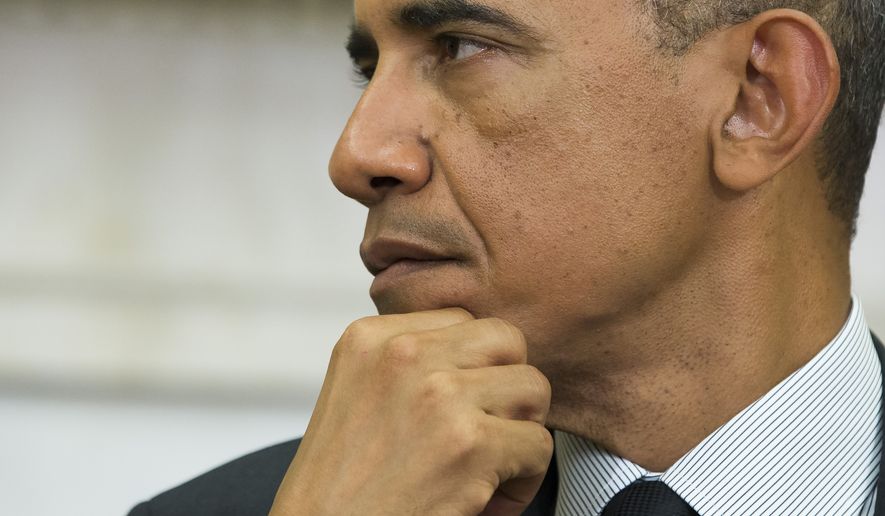As the Congress and the country debate the momentous question of how to meet the threat posed by the Islamic State and other enemies in the war on terrorism, one thing has become increasingly clear: It’s impossible to conduct and win a war when you’re led by an anti-war president.
The uncertain trumpet that President Obama has sounded in the face of Islamist gains in Iraq and Syria has left lawmakers, allies and ordinary citizens confused about both American policy and American resolve. The Code Pink protesters who tried to disrupt Capitol Hill hearings on the war should save one of their pink T-shirts for the president to wear the next time he addresses the nation on his war policy.
Like many, I admit to mixed feelings about what to do about the situation in the Middle East. Clearly, the United States has to do something, because doing nothing is not an option. I stand behind the president as he laid out his strategy for Iraq and Syria, because now is the time to present a united front to the world as our soldiers, sailors and airmen go into battle.
We must support what our military has been asked to do now and hope that in two years a new president will come to power who understands the stakes of the struggle we’re in and the necessity to fight it with every resource we have.
The fundamental problem is that we have an anti-war president, an anti-war secretary of state and anti-war secretary of defense — a national security team that wants to do as little as possible in this crisis for fear the American people will think we’re in a war. We’re already playing politics and word games with this conflict that rival anything that went on during Vietnam. If bombing Islamic State targets, deploying hundreds of American forces to Iraq and building a military coalition with our allies isn’t a war, what is it?
A president doesn’t get to have it both ways. If we decide as a nation we have to go after the Islamic State and other militant groups, we have to go after them with everything we’ve got. We can only hope the reality on the ground will convince the president he can’t fight a half-hearted war.
SEE ALSO: Obama not being tough enough in dealing with Islamic State: poll
It’s not just a question of politics. The divisions we saw in the House as it voted on arming Syrian rebels — with both Democrats and Republicans expressing skepticism and puzzlement at the president’s strategy and goals — reflect the uncertain leadership coming out of the Oval Office.
(Hillary Rodham Clinton, in her little “drop-in” at Tom Harkin’s Iowa Steak Fry that improbably attracted thousands of people to honor a retiring senator, has herself hinted she would be tougher than President Obama when it comes to waging war. But her fellow Democrats may not want that in 2016, and Mrs. Clinton’s record as secretary of state and her handling of the Benghazi disaster leave one doubtful she would be a big break from the current Democrat in the Oval Office.)
Perhaps worse, Mr. Obama’s hesitations and mixed messages are hurting our effort to enlist other nations in the cause. Just as on Capitol Hill, it’s hard to build a coalition on the global stage if your potential partners are not convinced you will carry through on your own commitments. Who would send their own troops into battle when they don’t know what kind of protection the U.S. military can offer, or what weird rules of engagement our commander in chief will impose on our fighting men and women?
Perhaps the most troublesome news item — in a week full of them — came not from Iraq but from our own southern border, where the reports are grow ever louder that the Islamic State and all kinds of other enemies are gathering to exploit this administration’s utter failure to secure the border. I trust what the Texas Department of Public Safety and the Texas Rangers are telling me — the hard proof is not there yet but they are increasingly certain that the danger is real and growing. Despite what the FBI and Department of Homeland Security say, the bad guys can come in at will along the porous border.
The dangers at home and abroad will only increase until we have a leader who displays a level of commitment to the fight equal to the sacrifices he is asking our troops to make.
• Tom DeLay, a former congressman from Texas and House majority leader from 2003 to 2005, writes a weekly column for The Washington Times and www.washingtontimes.com.
SEE ALSO: Obama: Troops in Iraq will shoot back if fired upon by Islamic State




Please read our comment policy before commenting.